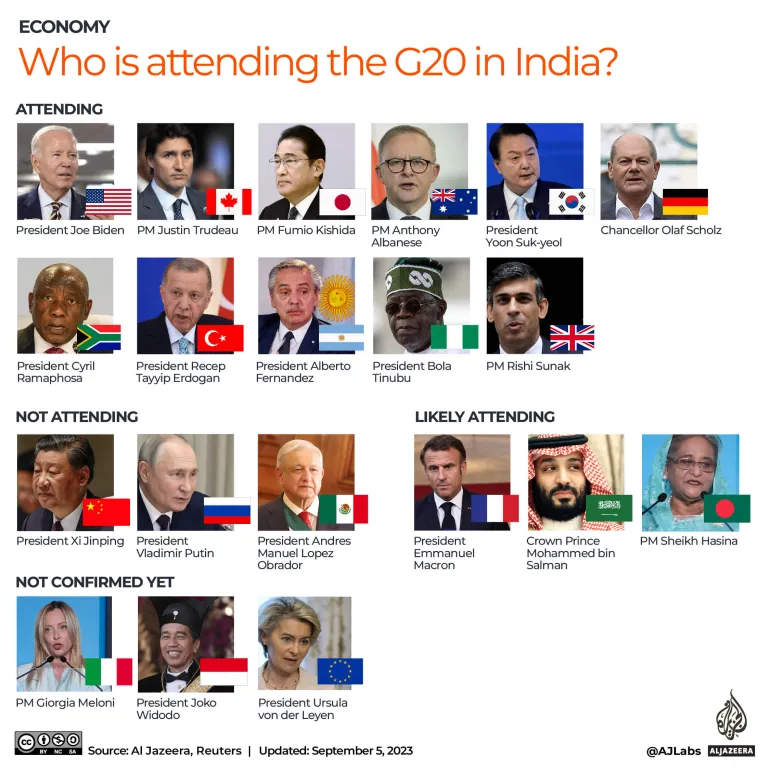Chinese President Xi Jinping skipping the weekend G20 summit in New Delhi is not unusual, Indian Foreign Minister Subrahmanyam Jaishankar says, adding that the decision has nothing to do with tense ties with New Delhi.
The diplomat told a local news agency on Wednesday that Xi’s absence will not affect negotiations to produce a consensus communique at the gathering of world’s largest economies slated to be held on Saturday and Sunday
Beijing has said that relations between the two nuclear-armed Asian giants remain “generally stable” despite Xi’s decision not to attend the Group of 20 summit in the Indian capital.
This week, China announced that Premier Li Qiang, who took office in March, would represent the country at the meeting. Jaishankar noted that a “country’s position is obviously reflected by whoever is the representative”.
Relations between China and India remain frosty over a border dispute that led to a clash three years ago in which 20 Indian and four Chinese soldiers were killed.
It has turned into a long-running standoff in the rugged Himalayan area where each side has stationed tens of thousands of military personnel backed by artillery, tanks and fighter jets.
The border clashes came a year after India stripped the semi-autonomous status from the disputed Kashmir region, parts of which are controlled by China. Beijing did not attend the G20 tourism meeting held in May in Indian-administered Kashmir. Late last month, New Delhi criticised Beijing for including Indian territories in China’s new map released on August 28
This week, India is staging military exercises near the Chinese border, which will continue through the summit.
Analysts said Xi giving the summit a miss was a new setback to ties between the Asian giants.
But Xi’s absence could also be a signal of his narrative of ‘the East is rising, and the West is falling’ as well as showing solidarity with Russian President Vladimir Putin, said Wen-Ti Sung, political scientist at Australian National University.
Without mentioning the dispute with India or the reason for Xi’s decision not to attend, Chinese Ministry of Foreign Affairs spokesperson Mao Ning said Chinese leaders have “always supported India’s hosting of this year’s summit and are ready to work with all parties to make the G20 summit a success”.
“At present, China-India relations remain generally stable, and dialogue and communication have been maintained at all levels,” Mao told reporters at a daily briefing.
“We are willing to work with the Indian side to promote greater and continuous development of China-India relations,” she said.
Frictions between the two have also arisen over trade, technology and investment and India’s growing strategic ties with China’s main rival, the United States. Both India and China have expelled the other’s journalists and once-plentiful educational exchanges have all but dried up.
India recently overtook China as the world’s most populous nation and the two are rivals in computers, steelmaking, space exploration and other high-tech fields

The summit of the world’s richest countries is being held in the context of a “very turbulent” global environment, and expectations for the G20 to find solutions to some of the world’s pressing problems are “very high”, Jaishankar told the ANI news agency.
The G20 has been divided on the war in Ukraine, and analysts and officials have said the absence of Xi and Putin mean it would be difficult to arrive at a consensus Leaders Declaration at the summit.
The bloc is divided on commitments to phase down fossil fuel use, increase renewable energy targets and reduce greenhouse gas emissions, they said.
Jaishankar also played down a threat from his Russian counterpart, Sergey Lavrov, who will represent Moscow at the summit in Putin’s absence, that Russia will block the summit’s final declaration unless it reflects Moscow’s position on Ukraine and other crises.
He said countries try to maximise their negotiating positions and people should not “prejudge” the outcome.
“I am confident that every one of the G20 coming to Delhi will understand the responsibility that they bear, … that the other 180 countries of the world are looking to them to set directions and that they cannot afford to fail them"



Cheeky India